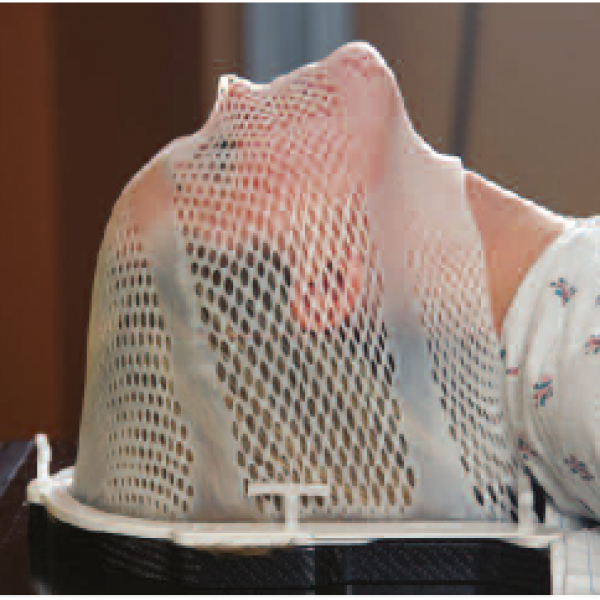Radiotherapy for mouth, head and neck cancer

External radiotherapy
External radiotherapy uses high-energy rays to kill cancer cells. The radiation beams are aimed at the cancer using a machine called a linear accelerator.

Planning
You will go to the hospital before treatment for planning. An important part of the planning process is simulation. This involves using a CT scanner to pinpoint the area to be treated. You will also most likely have a mask made to keep you in the same position every time you have treatment.
Dental check-up
You will need a check-up by a dental specialist (dental oncologist) before your treatment.
Radiotherapy can affect your sense of taste and the muscles in your mouth. It may also affect your salivary glands, which can cause a dry mouth. This in turn can lead to tooth decay (dental caries). It is also more difficult to extract teeth after radiotherapy as the treatment affects bone health.
X-ray
Before treatment, you are likely to have an X-ray of your jaw and teeth called an orthopantomogram (oPG).
Having radiotherapy
During treatment you will first be positioned carefully on a treatment table. Then the machine will move around you so that you receive the precise treatment at different angles or in an arc. The treatment normally takes several minutes and is painless.
Most people receive radiotherapy as outpatients, travelling to the radiotherapy unit each day, with a break at weekends.
The course can be several treatments over a number of days or weeks (usually 4-7 weeks).
External radiotherapy does not make you radioactive. It is completely safe for you to mix with family and friends, including pregnant women and children.
Side-effects of radiotherapy to the head and neck area
- Mouth and taste changes: Sore mouth and throat, difficulty swallowing, dry mouth and throat, thick sticky saliva (mucus), mouth infection, loss of taste or taste changes, jaw stiffness (and reduced mouth/jaw opening)
- Voice changes: A change in your voice or losing your voice for a time.
- Skin changes
- Tiredness (fatigue)
- Hair loss: In the treated area, e.g. beard or moustache, not normally head hair
- Breathing problems
- Difficulty with eating and drinking and weight loss
If you get any side-effects, they usually develop during or shortly after your treatment and get better within a few weeks. These are called short-term or acute side-effects. It’s also possible to get late side-effects, which develop some time after treatment. Some side-effects last for a long time or may even be permanent, but it is rare to have long-term problems.
Read more about coping with side-effects of radiotherapy.
Osteoradionecrosis (ORN)
After radiotherapy your jaw bone can have less blood supply and not heal so well. If the bone is injured by surgery, tooth extractions or denture irritations, a condition called osteoradionecrosis (ORN) can develop.
Keep your teeth in good condition and treat any tooth decay (cavities) quickly. If a tooth has to be taken out after radiotherapy, tell your medical team and see a dentist who is used to dealing with patients who have had radiotherapy. Extra precautions will be taken such as prescribing antibiotics to prevent infection.
Tell your doctor or dentist immediately if you develop any problems with your teeth or gums, or swelling, pain, heaviness or numbness of your jaw.

For more information
Phone
1800 200 700


